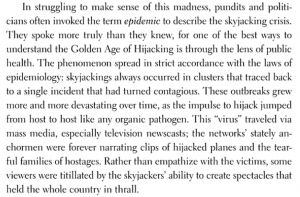Brendan Koerner‘s new book, The Skies Belong to Us: Love and Terror in the Golden Age of Hijacking, dropped last week to critical acclaim. It tells the story of a pair of unlikely hijackers (a “troubled Vietnam vet;” a “mischievous party girl”) against the backdrop of American air travel in the 1960s and ’70s, when a hijacking occurred nearly once a week. Koerner writes:
Koerner goes on to hold his readers in thrall. Of the book the New York Times‘ Dwight Garner wrote: “…It’s such pure pop storytelling that reading it is like hearing the best song of summer squirt out of the radio. Both the author and his subjects are so audacious that they frequently made me laugh out loud.” Garner’s engaging synopsis:
The best move that Mr. Koerner makes…is wrapping all his information around one incredible single story, that of a veteran named Roger Holder and an imposingly beautiful would-be hippie named Cathy Kerkow, who in 1972 hijacked Western Airlines Flight 701, on its way from Los Angeles to Seattle, as a vague protest against the Vietnam War.
This event started small. It grew big and shaggy, as if a vision concocted by the director Robert Altman. It became the longest-distance skyjacking in American history. The plane ended up in Algiers.
Along the way, Angela Davis, Eldridge Cleaver and Jean-Paul Sartre became involved. Astrology charts were consulted midflight, and a lot of marijuana was smoked while cruising over the American heartland. Mr. Holder and Ms. Kerkow joined the mile-high club. Did I mention that while they were in the air, a second plane was hijacked over American airspace?
The couple became folk heroes of a sort, Bonnie and Clyde at 33,000 feet. Later they would mingle in Paris with movie stars and the social elite….
Koerner, who writes for Wired and others, and who just talked about the book with Worldhum’s Eva Holland, told Longreads how he came across the idea:
On the morning of October 11, 2009, I encountered the 616-word newspaper story that would change my life. It was a New York Times report about a man named Luis Armando Peña Soltren, a former Puerto Rican nationalist who had helped hijack a Pan Am jet to Cuba in 1968. After spending the next 41 years living in Fidel Castro’s socialist ‘paradise,’ he had decided that he could no longer bear to remain apart from the wife and daughter he had left behind. So at the age of 66, Soltren had voluntarily returned to the United States. He had been arrested the moment he stepped off his plane at JFK Airport; he now faced a possible life sentence if convicted of air piracy.
I was first struck by how much Soltren’s longing for his family had slowly swelled as the years flew by; it had taken him over four decades to muster the courage to risk his freedom for a chance to see his wife and daughter again. (I’ve always been drawn to tales of fugitives and exiles, who must often pay a steep psychological price in order to reinvent themselves.) But the more I thought about Soltren’s predicament, the more I was intrigued by its historical element—namely, the fact that he and two comrades had actually managed to hijack a Boeing 707 to Cuba in the first place. The New York Times piece gave the impression that such crimes were run-of-the-mill during the Vietnam Era. Given the airport security gauntlets we’re forced to endure these days, that seemed an almost unfathomable notion.
Read the rest here, on Longreads, along with an excerpt from the book.
Further Koerner reading recommendations:
- Koerner dissects Scott Anderson’s “The Hunger Warriors” for “Why’s this so good?”
- “How’d you find that secret-compartments story, Brendan Koerner?” in which he backstories a Wired piece.
- Piano Demon: the globe-trotting, gin-soaked, too-short life of Teddy Weatherford, the Chicago jazzman who conquered Asia, via The Atavist



